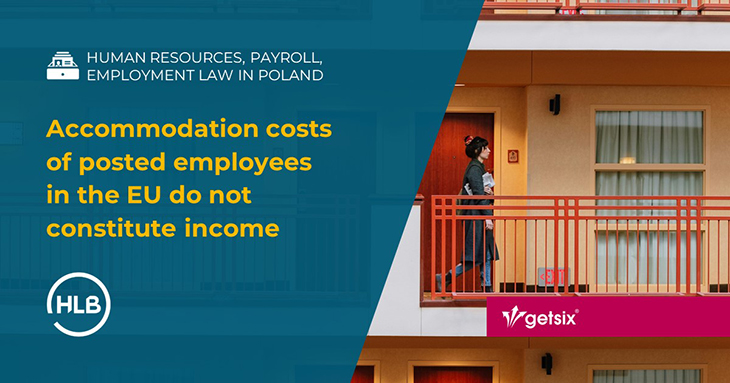Accommodation costs of posted employees in the EU do not constitute income
In recent years, the issue of taxation of accommodation costs for employees posted by employers to other EU member states has gained importance. In this context, the judgments of the Supreme Administrative Court (NSA) are crucial, as they clarify that such costs do not constitute income for the employee. The judgments with reference numbers II FSK 270/21, II FSK 243/21, and especially the most recent judgment dated May 9, 2024 (reference number II FSK 951/21) play a key role in this context.
Background of the Case
The case of the judgment of May 9, 2024 (reference number II FSK 951/21) concerned an employee who was sent by his employer to work in another EU member state. The employer covered the costs of his accommodation, which raised the question of whether such expenses constitute the employee’s income and whether they are subject to personal income tax (PIT).
Reasoning of the Supreme Administrative Court
In its judgment of May 9, 2024, as well as in previous judgments of August 1, 2023 (II FSK 270/21, II FSK 243/21), the Supreme Administrative Court has put forward cogent arguments:
- Nature of Accommodation Costs: The Supreme Administrative Court emphasized that the accommodation costs borne by the employer as part of a business trip are related to the employee’s performance of their official duties. Accommodation is necessary for the employee to carry out their tasks at the place of deployment.
- No direct Benefit for the Employee: The court found that the assumption of accommodation costs by the employer does not bring any direct financial benefit to the employee. It is an expense incurred in the employer’s interest.
- Exception from taxable Income: The Supreme Administrative Court also referred to the provisions of the Income Tax Act, according to which the costs associated with the posting of employees may constitute an exception to the general rules on taxable income.
Amendments to Directive 96/71/EC
With the amendment of Directive 96/71/EC on the posting of workers in the framework of the provision of services, the position of the Supreme Administrative Court has changed in favour of employers and employees. These amendments aim to strengthen the protection of the rights of posted workers, including ensuring appropriate working conditions and remuneration, and also cover accommodation issues. The current version of the Directive emphasizes that accommodation costs borne by the employer should not be a burden on the employee or be considered as part of the employee’s remuneration.
Consequences of the Supreme Administrative Court Rulings
The rulings of the Supreme Administrative Court are important for employers and employees in the context of international postings. They confirm that the assumption of accommodation costs for an employee posted to another EU member state by the employer does not constitute taxable income for the employee.
Application in Practice
For employers, this means they can cover the accommodation costs of their posted employees without fear of additional tax burdens for those employees. Employees can be sure that they will not have to pay income tax on these costs, which in practice can lead to greater professional mobility within the EU.
Summary
The judgments of the Supreme Administrative Court, in particular the judgment of May 9, 2024 (reference number II FSK 951/21), clearly state that accommodation costs borne by the employer as part of the posting of employees to other EU member states do not constitute income on the part of the employee. This position complies with the new provisions of Directive 96/71/EC, which strengthen the protection of the rights of posted workers. This is important news for both employers and employees, as it ensures clarity and tax security in the context of international postings. It should be noted that none of the above-mentioned NSA judgments apply to posting employees within Poland. Therefore, in such postings, caution should be exercised when qualifying accommodation costs as non-taxable income. In such cases, it is recommended to obtain a tax law interpretation confirming the correctness of such a position.
 Source: This article was prepared by Tomasz – Senior Tax Consultant at getsix® Tax & Legal
Source: This article was prepared by Tomasz – Senior Tax Consultant at getsix® Tax & Legal
If you have any questions regarding this topic or if you are in need for any additional information – please do not hesitate to contact us:
CUSTOMER RELATIONSHIPS DEPARTMENT

ELŻBIETA
NARON-GROCHALSKA
Head of Customer Relationships
Department / Senior Manager
getsix® Group
***














